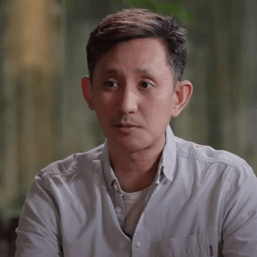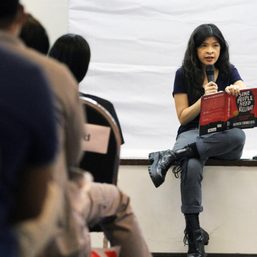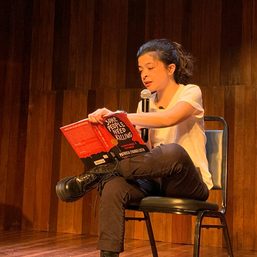SUMMARY
This is AI generated summarization, which may have errors. For context, always refer to the full article.
The Philippine human rights case is being decided by the International Criminal Court (ICC) at the same time that the Court faces a “decisive moment” in history where it needs to prove its relevance in global justice.
“That’s where we are at this point in time for the Court, it’s a decisive moment, there are challenges, there are opportunities and there are also risks in terms of what might come next for the Court,” said Elizabeth Evenson, Human Rights Watch’s Associate Director for International Justice Program, on Wednesday, December 23, at an online side event of the 19th Session of the Assembly of States Parties (ASP) to the Rome Statute.
The side event was organized by the Washington DC-based Stop The Drug War group, with a focus on the Philippines and Bangladesh cases pending before the ICC Office of the Prosecutor (OTP).
Prosecutor Fatou Bensouda last week announced that her office has found “reasonable basis to believe” that crimes against humanity were committed in President Rodrigo Duterte’s war on drugs, but said she has yet to decide whether to open a formal investigation.
The opening of an investigation will be crucial because it is the stage when the prosecutor can request ICC judges to issue summons or even arrest orders. Duterte and his former police chief, now Senator Ronald “Bato” Dela Rosa, are named as principals in many of the communications submitted to the ICC.
To open an investigation, the prosecutor will need to seek authorization from the pre-trial chamber. Bensouda said she anticipates she would reach a decision on this in the first half of 2021.
Evenson pointed out that the ICC is at a crossroads of sorts as it recently commissioned a study on how it can be more effective and meaningful.
The most common criticism against the ICC is its inability to make governments and state leaders comply with its orders, with some of the subjects able to evade the court’s arrest warrants for years.
The ICC has no police powers and relies on the cooperation of the states parties to arrest their own citizens, or if the subject travels to another state party, for that government to execute the arrest.
In the case of Ukraine, Evenson pointed out that while Bensouda said she finds enough basis to open an investigation, she would also have to assess priorities given the workload of the OTP.
“It doesn’t mean that they won’t go forward with the next step of applying with the pre-trial chamber for permission to investigate but it certainly seems to put a question mark over how the court can manage its workload given the reality of the resources,” Evenson said.
Will Philippines be priority?
It’s hard to say now whether the Philippines is a priority for the ICC, which is a point of concern for opposition leaders who are advocating for an international scrutiny of Duterte’s alleged human rights abuses.
The sense of urgency is also rooted in what Senator Leila de Lima’s chief of staff Fhillip Sawali calls “gimmicks” to deceive international bodies. They are being made to believe that the Duterte government is doing something to solve the abuses.
Sawali cited the Department of Justice or DOJ’s human rights summit this month, and the ongoing drug war review panel that would reinvestigate the more than 5,000 deaths in the hands of policemen in their anti-drug operations. Human rights groups use a much higher number at over 20,000.
A Rappler analysis in 2019 found that investigative gaps and prosecutorial loopholes allowed thousands of cases in the drug war to go unsolved.
The DOJ’s efforts have been cited by the United Human Rights Council in a resolution that spared the Duterte government from tighter scrutiny.
The DOJ’s drug war review panel was a move to avoid the ICC because Bensouda would have to assess admissibility of the case, meaning, she would have jurisdiction only if Philippines’ local justice system is proven to be unwilling or unable to investigate the crimes by itself.
Sawali cited a recent study by local group IDEALS or Initiatives for Dialogue and Empowerment through Alternative Legal Services, which reviewed 400 cases of extrajudicial killings and found that only a handful were investigated by the police.
“Only 32% underwent initial police investigation and of this number, 98% went no further than this first step. For 58.5% of this cases, the families of victims had not been given any information whatsoever,” said Sawali.
Presidential Spokesperson Harry Roque, a former human rights lawyer and among the early advocates for the Philippines to join the ICC, said he was confident that the pre-trial chamber would not authorize an investigation because of the Afghanistan case.
The ICC in 2019 refused to open an investigation into Afghanistan, saying that the government’s non-cooperation would be detrimental to the process. That decision was widely slammed by the international human rights community.
Roque conveniently did not mention that the 2019 decision had already been reversed and that there now is an ICC probe into Afghanistan.
Like the Afghan government, Duterte’s government refused to cooperate with the ICC, even withdrawing the Philippines from the Rome Statute. (READ: What the ICC pullout case means for Duterte and the Supreme Court)
It’s hard to predict whether the same initial logic on Afghanistan would be followed if or when Bensouda seeks authorization to investigate the Philippines.
“With the reversal of that decision, we’ll have to see whether any pre-trial chamber in the future would consider that to be relevant in their determination. We certainly hope not,” Evenson said.
“It would essentially prevent the court from doing its job because they seem to require such a guarantee of cooperation that just doesn’t exist,” said Evenson.
Clock is ticking, abuses replicated
Stop the Drug War executive director David Borden said that “under the best of circumstances, these investigations take a long time” and might still be ongoing when Duterte steps down in June 2022.
“Based on history, it’s hard for me to see an investigation completing, and indictments being issued before the middle of 2022,” said Borden.
“The decision makers of the ICC would be looking at what would be in the interest of justice, if Duterte is no longer in power but he’s living – certainly other perpetrators in this would be living – cases can be brought at any time,” Borden added.
Human rights groups are upping the pressure on the ICC to move more decisively on these cases, citing replication of abuses in government drug wars, in Bangladesh for example.
Ashraf Zaman of the Asian Legal Resource Centre said that “there is no doubt that there is a replication of the Duterte-style war on drugs and extrajudicial executions in Bangladesh with the same characteristics of impunity.”
“From all institutions, including the judiciary and other organs of the state. That also includes a very systematic denial of justice, access to justice to the victims in all layers of the judiciary,” said Zaman.
Evenson said to also consider the fact that Bensouda will end her 9-year term in June 2021, and the states parties will need to elect a successor.
“It’s consequential for the states parties who the next prosecutor would be,” Evenson said, adding that in at least the Ukraine case, Bensouda said she will consult her successor on which cases to prioritize. – Rappler.com
Add a comment
How does this make you feel?




![[WATCH] Dahas Project, the team that continues to count drug war victims](https://www.rappler.com/tachyon/2024/03/dahas-project-2.jpg?resize=257%2C257&crop=404px%2C0px%2C1080px%2C1080px)
![[The Slingshot] Alden Delvo’s birthday](https://www.rappler.com/tachyon/2024/04/tl-alden-delvo-birthday.jpg?resize=257%2C257&crop=263px%2C0px%2C720px%2C720px)
![[EDITORIAL] Ang low-intensity warfare ni Marcos kung saan attack dog na ang First Lady](https://www.rappler.com/tachyon/2024/04/animated-liza-marcos-sara-duterte-feud-carousel.jpg?resize=257%2C257&crop=294px%2C0px%2C720px%2C720px)
![[Newsstand] Duterte vs Marcos: A rift impossible to bridge, a wound impossible to heal](https://www.rappler.com/tachyon/2024/04/duterte-marcos-rift-apr-20-2024.jpg?resize=257%2C257&crop=278px%2C0px%2C720px%2C720px)



![[Rappler’s Best] Patricia Evangelista](https://www.rappler.com/tachyon/2024/04/unnamed-9-1.jpg?resize=257%2C257&crop=486px%2C0px%2C1333px%2C1333px)


There are no comments yet. Add your comment to start the conversation.